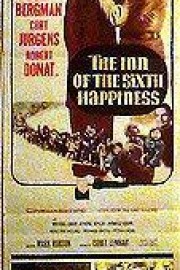The Inn of the Sixth Happiness
A big part of the reason for my choosing “The Inn of the Sixth Happiness” to be a part of my “Movie a Week” series was because my mother had it listed as one of her favorite films before 1973 when we were first coming up with best and favorites lists when we first had the idea of writing a movie book together. I got it for her for her birthday (or Christmas) one year, and I decided the time was right to watch it myself. It’s been fascinating, over the years, to experience the cross-section of films my mother has loved over the years, and to see what resonated with her. “The Inn of the Sixth Happiness” is not different.
The director of “Inn of the Sixth Happiness” is Mark Robson, who was nominated for an Oscar for this film, but whom I first heard about as one of the directors of Val Lewton’s 1940s supernatural thrillers like “Isle of the Dead” and “Bedlam.” This film has nothing else in common with those earlier films, although all three show Robson as a director of versatility and intelligence, capable of telling any sort of story he is asked to tell. Here, his film is based on a novel, The Small Woman, by Alan Burgess, and tells the story of Gladys Aylward, an English chambermaid whose heart and faith tell her to be a Christian missionary in China. This is pre-WWII, and even then, it is a dangerous journey for her to make. The people who place missionaries back in England tell her no, as her education is not enough for such a post. She is persistent, however, and she does make her way to a remote province in China where she is shown the ropes by an older woman of faith, Jeannie Lawson (Athene Seyler). It isn’t long before she takes over Ms. Lawson’s mission, named The Inn of the Sixth Happiness, herself, and she makes initially-tenuous bonds with the local Mandarin (Robert Donat) and a Eurasian colonel (Curt Jurgens). She becomes a beloved figure in the providence, and when war breaks out, she is forced to make a perilous journey with 100 orphans in tow, armed only with her faith and determination to lead her, although she does get some help on the way.
It’s fascinating for me to watch this film, not just in knowing my mother, but in the context of both cinema, and my own life now. My mother is a woman of faith, and while that might be a part of why the film resonated with her, the character of Aylward (played by Ingrid Bergman), with her strength and stubbornness, is likely a bigger reason it stayed with her, along with the historical slant of the film being based on a true story. From my perspective, “The Inn of the Sixth Happiness” comes not only six months after having watched Martin Scorsese’s “Silence,” also about Christian missionaries who find resistance in an Asian land, but also during a summer where one of my nieces is about to embark on a missionary trip of her own- my wife’s family is Mormon, so we will likely be seeing more of my nieces and nephews go on similar callings for their faith. Of course, the circumstances of “The Inn of the Sixth Happiness” and “Silence” are unlikely to happen with my niece, but that personal connection that I now have makes something like this resonate with me a little stronger.
There’s another cinematic fascination that struck me in watching this film, and it’s with regards to its leading lady herself. By this point in her career, Ingrid Bergman had already made films about faith with her husband, Roberto Rossellini, in the form of “Stromboli,” “Europa ’51” and “Voyage to Italy,” along with earlier films, “Joan of Arc” and “The Bells of St. Mary’s,” so in that perspective, it’s not surprising that she would star in “The Inn of the Sixth Happiness” (although her casting was appalling in the eyes of the real-life Aylward, who was much shorter (and definitely not Swedish). However, as someone who best knows her for “Casablanca” and Hitchcock’s “Notorious,” who has not yet seen those films for himself (only heard about them courtesy of Martin Scorsese’s “My Voyage to Italy”), it’s a bit of a revelation to see Bergman take on such a role. She is still better in those iconic films, but we see the throughline to Aylward that Bergman made a little clearer, and see that she was passionate about the role for reasons beyond just the potential award possibilities (after all, she had just been nominated the year before for Fox’s “Anastasia”)- it feels like faith and the spiritual nature of life was important for her to explore, and this film gave her another opportunity to do so. It follows a great many Hollywood formulas, which her films with her husband did not, but “The Inn of the Sixth Happiness” is an interesting flashpoint in the great actress’s career, one I’m grateful for my mother for bringing to my attention.










